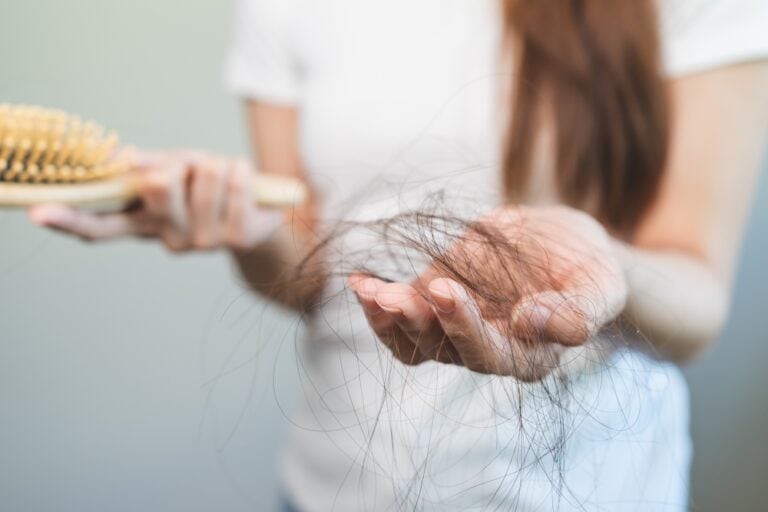
Women's Hair Loss Treatment in Bridgewater NJ
Restore confidence with expert diagnosis and personalized treatment for female pattern hair loss, hormonal thinning, and stress-related hair loss. PS Dermatology & Surgery offers proven solutions including Minoxidil therapy and hormone treatments to help you regain fuller, healthier hair.
👨⚕️ Double Board Certified in Dermatology and Mohs Surgery
🎓 Fellowship Trained in Mohs Surgery
Hair Loss in Women
There are a number of nonscarring alopecias. As the name implies, they are not associated with scarring and therefore do not permanently destroy the hair follicle. In other words, the hair is physically capable of regrowing. The two most common examples of nonscarring alopecia are androgenetic alopecia and telogen effluvium.
Androgenetic alopecia results when an individual’s hormones (androgens) cause genetically sensitive follicles to shrink and eventually shed their hair. This is essentially the equivalent of the hair loss that men often experience. Although such hair loss is usually less pronounced in women, it tends to be more diffuse. It usually presents as mild to moderate thinning throughout the entire top of the scalp. In contrast to that which occurs in men, it rarely causes the frontal hairline to recede in women.
For some patients with general, nonspecific hair loss, it’s as simple as correcting underlying anemia or even thyroid dysfunction. Blood tests may be ordered which can show these deficiencies and, once corrected, the hair loss should stop.
For suspected androgenetic alopecia, the primary question is whether the loss is due to excessive hormone production or whether it’s simply due to genetic predisposition. Signs that a woman might be experiencing excessive hormone production would include irregular menstrual cycles or excessive hair growth on the face, chest, or arms.
On the other hand, if a patient tells us that other women in the family have experienced similar hair loss, then genetics alone are likely to blame. It’s important to keep in mind that such predispositions can seemingly ‘skip’ generations. So even if no other related females are known to have hair loss, it still may very well be a genetic problem
What are some treatment options?
The treatment of androgenetic alopecia in females is difficult. Sometimes hormone blocking pills can be used, but their effectiveness isn’t as consistent as that seen in men. Minoxidil (name brand Rogaine®) is a liquid medication that can be applied daily to the scalp. It’s fairly effective if used consistently, though users should expect to wait at least 46 months before results can be seen.
Diagnosis of telogen effluvium if more likely in those that have a history of significant recent or ongoing stress. The nice thing about telogen effluvium is that it nearly always completely resolves on its own once the stressful event has passed. In fact, for many patients with telogen effluvium, a sudden increase in hair loss is actually caused by new hair growth ‘pushing out’ the older dormant hairs.
Rarely, some patients will have a chronic form of telogen effluvium especially if stress or other health issues are ongoing. For these patients, hormoneblocking medications won’t help since hormones aren’t the underlying cause of the problem. Those affected by chronic telogen effluvium should talk to their dermatologist about available treatment options.
Ready to Restore Your Hair and Confidence?
Don't let hair loss hold you back from feeling your best. Our experienced dermatologists will identify the root cause of your hair thinning and create a customized treatment plan to help you achieve the fuller, healthier hair you deserve.


